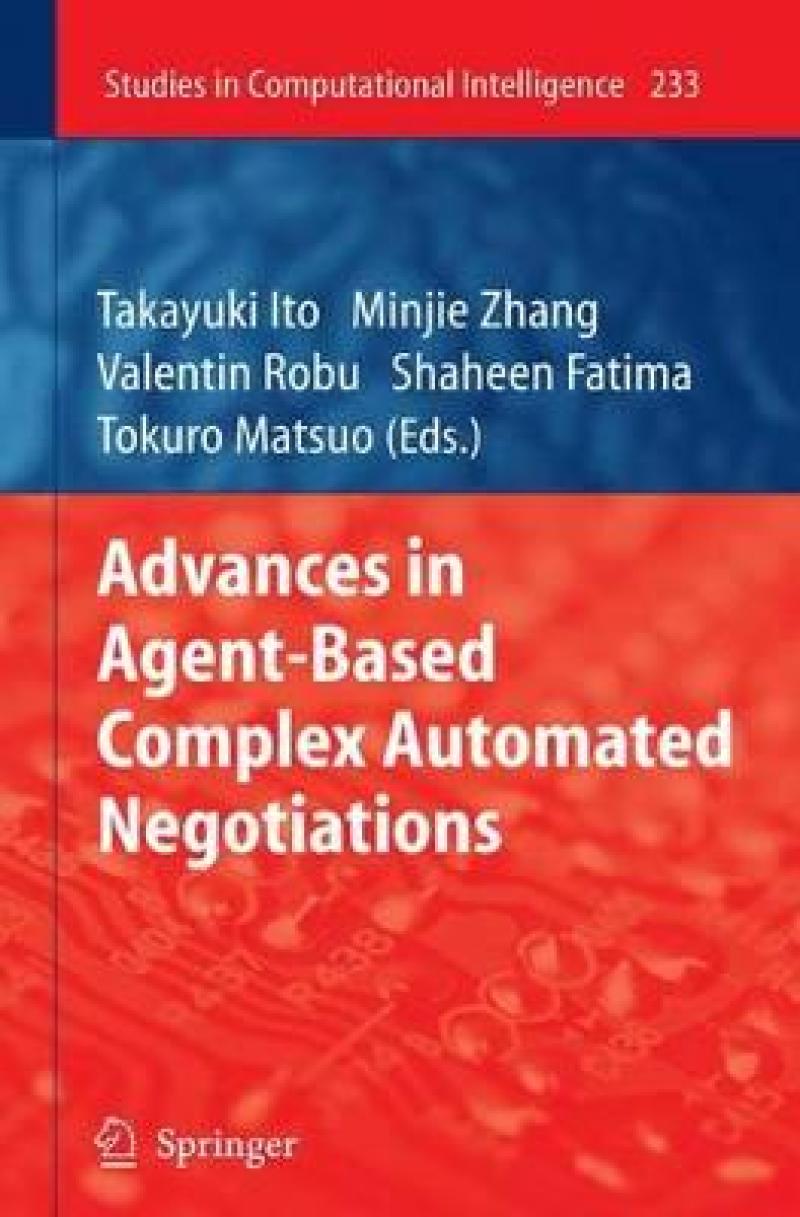Complex Automated Negotiations have been widely studied and are becoming an important, emerging area in the field of Autonomous Agents and Multi-Agent Systems. In general, automated negotiations can be complex, since there are a lot of factors that characterize such negotiations. These factors include the number of issues, dependency between issues, representation of utility, negotiation protocol, negotiation form (bilateral or multi-party), time constraints, etc. Software agents can support automation or simulation of such complex negotiations on the behalf of their owners, and can provide them with adequate bargaining strategies. In many multi-issue bargaining settings, negotiation becomes more than a zero-sum game, so bargaining agents have an incentive to cooperate in order to achieve efficient win-win agreements. Also, in a complex negotiation, there could be multiple issues that are interdependent. Thus, agent’s utility will become more complex than simple utility functions. Further, negotiation forms and protocols could be different between bilateral situations and multi-party situations. To realize such a complex automated negotiati on, we have to incorporate advanced Artificial Intelligence technologies includes search, CSP, graphical utility models, Bays nets, auctions, utility graphs, predicting and learning methods. Applications could include e-commerce tools, decisionmaking support tools, negotiation support tools, collaboration tools, etc.
These issues are explored by researchers from different communities in Autonomous Agents and Multi-Agent systems. They are, for instance, being studied in agent negotiation, multi-issue negotiations, auctions, mechanism design, electronic commerce, voting, secure protocols, matchmaking & brokering, argumentation, and co-operation mechanisms. This book is also edited from some aspects of negotiation researches including theoretical mechanism design of trading based on auctions, allocation mechanismbased on negotiation among multi-agent, case-study and analysis of automated negotiations, data engineering issues in negotiations, and so on.
Les mer
This book is also edited from some aspects of negotiation researches including theoretical mechanism design of trading based on auctions, allocation mechanismbased on negotiation among multi-agent, case-study and analysis of automated negotiations, data engineering issues in negotiations, and so on.
Les mer
The Prediction of Partners’ Behaviors in Self-interested Agents.- Sequential Auctions for Common Value Objects with Budget Constrained Bidders.- A Comparative Study of Argumentation- and Proposal-Based Negotiation.- The Blind Leading the Blind: A Third-Party Model for Bilateral Multi-issue Negotiations under Incomplete Information.- Using Clustering Techniques to Improve Fuzzy Constraint Based Automated Purchase Negotiations.- Assess Your Opponent: A Bayesian Process for Preference Observation in Multi-attribute Negotiations.- Designing Risk-Averse Bidding Strategies in Sequential Auctions for Transportation Orders.- CPN-Based State Analysis and Prediction for Multi-agent Scheduling and Planning.- Adaptive Commitment Management Strategy Profiles for Concurrent Negotiations.- Analyses of Task Allocation Based on Credit Constraints.- Erratum: The Prediction of Partners’ Behaviors in Self-interested Agents.
Les mer
Complex Automated Negotiations have been widely studied and are becoming an important, emerging area in the field of Autonomous Agents and Multi-Agent Systems. In general, automated negotiations can be complex, since there are a lot of factors that characterize such negotiations. These factors include the number of issues, dependency between issues, representation of utility, negotiation protocol, negotiation form (bilateral or multi-party), time constraints, etc. Software agents can support automation or simulation of such complex negotiations on the behalf of their owners, and can provide them with adequate bargaining strategies. In many multi-issue bargaining settings, negotiation becomes more than a zero-sum game, so bargaining agents have an incentive to cooperate in order to achieve efficient win-win agreements. Also, in a complex negotiation, there could be multiple issues that are interdependent. Thus, agent’s utility will become more complex than simple utility functions. Further, negotiation forms and protocols could be different between bilateral situations and multi-party situations. To realize such a complex automated negotiati on, we have to incorporate advanced Artificial Intelligence technologies includes search, CSP, graphical utility models, Bays nets, auctions, utility graphs, predicting and learning methods. Applications could include e-commerce tools, decisionmaking support tools, negotiation support tools, collaboration tools, etc.
These issues are explored by researchers from different communities in Autonomous Agents and Multi-Agent systems. They are, for instance, being studied in agent negotiation, multi-issue negotiations, auctions, mechanism design, electronic commerce, voting, secure protocols, matchmaking & brokering, argumentation, and co-operation mechanisms. This book is also edited from some aspects of negotiation researches including theoretical mechanism design of trading based on auctions, allocation mechanismbased on negotiation among multi-agent, case-study and analysis of automated negotiations, data engineering issues in negotiations, and so on.
Les mer
Presents recent research in agent-based complex automated negotiations
GPSR Compliance
The European Union's (EU) General Product Safety Regulation (GPSR) is a set of rules that requires consumer products to be safe and our obligations to ensure this.
If you have any concerns about our products you can contact us on ProductSafety@springernature.com.
In case Publisher is established outside the EU, the EU authorized representative is:
Springer Nature Customer Service Center GmbH
Europaplatz 3
69115 Heidelberg, Germany
ProductSafety@springernature.com
Les mer
Produktdetaljer
ISBN
9783642031892
Publisert
2009-09-14
Utgiver
Vendor
Springer-Verlag Berlin and Heidelberg GmbH & Co. K
Høyde
235 mm
Bredde
155 mm
Aldersnivå
Research, P, 06
Språk
Product language
Engelsk
Format
Product format
Innbundet
